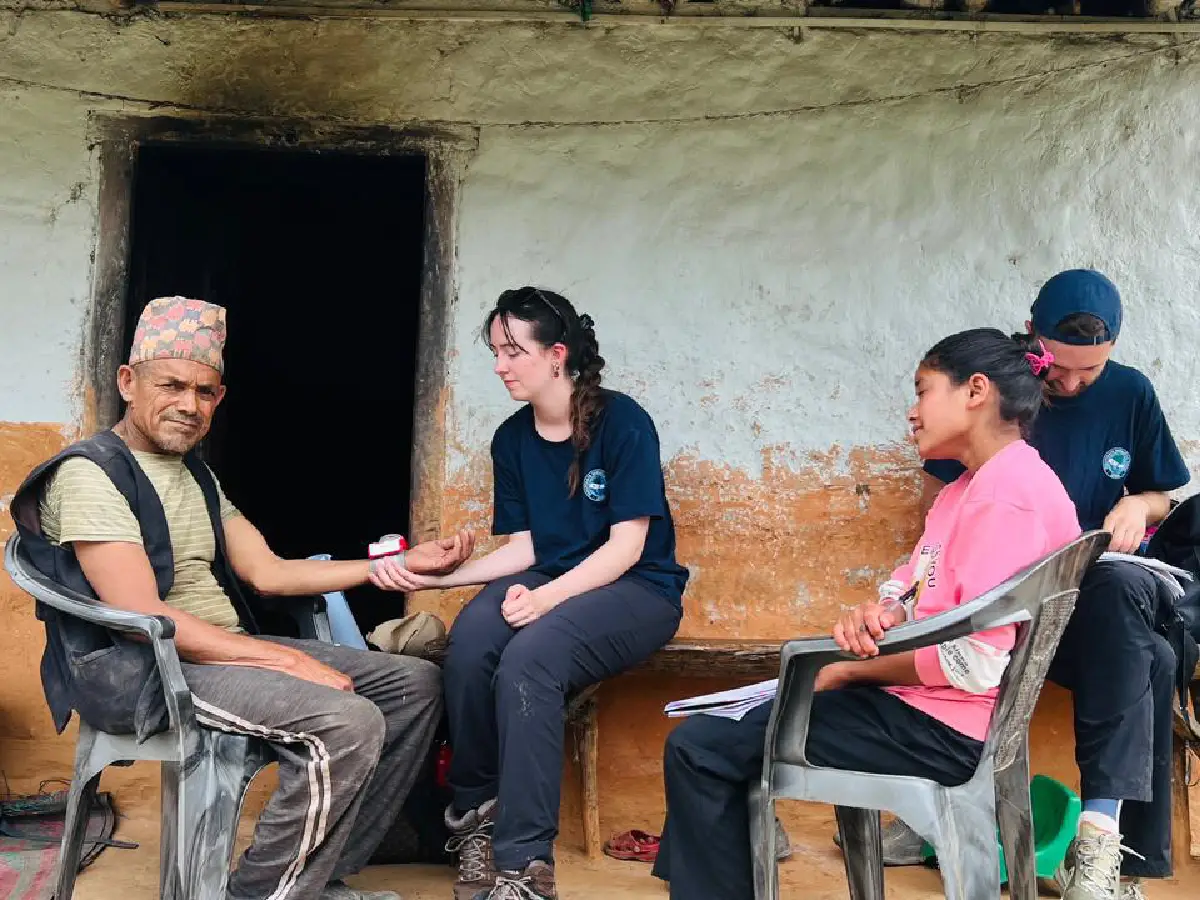
Join the Public Health Internship in Nepal to make a global impact. This program offers a unique blend of professional growth, cultural immersion, and hands-on community engagement. Explore real-world health challenges, build impactful solutions, and lay a foundation for a fulfilling career in public health.
Transform Lives Through Public Health Initiatives
Nepal faces numerous public health challenges, including limited access to healthcare in rural areas, high maternal and infant mortality rates, and inadequate sanitation infrastructure. These issues highlight the urgent need for innovative health programs and grassroots engagement.
The Public Health Internship in Nepal empowers interns to tackle these challenges through impactful projects in schools, healthcare centers, and remote villages. Interns gain hands-on experience in global public health, improving health outcomes while developing valuable professional skills.
Why Choose a Public Health Internship in Nepal?
- Urgent Health Needs: Address critical issues like malnutrition, maternal health, and sanitation in underserved areas.
- Unique Setting: You will work in culturally rich locations, from Kathmandu’s outskirts to the serene Everest region and Okhaldhunga.
- Career Development: Gain expertise in health internship opportunities, making your resume stand out for public health internships abroad.
- Cultural Immersion: Live with local families, learn the Nepali language, and experience traditional customs firsthand.
Location
Internships are based in diverse regions, including:
- Kathmandu Valley: Blend of urban outreach and rural engagement.
- Everest Region & Okhaldhunga: Remote areas with stunning landscapes and cultural heritage.
Duration: Flexible options range from 4 to 20 weeks, accommodating students and professionals.
Goals
- Promote health education and awareness in rural and urban communities.
- Reduce preventable diseases by introducing sustainable hygiene practices.
- Support maternal, child, and adolescent health initiatives.
Community Impact
Interns directly improve community health through education and outreach programs. These efforts empower locals to adopt healthier practices, reducing illness and increasing access to critical resources.
Primary Duties
Interns will engage in a variety of meaningful activities, including:
- Organizing health education sessions in schools.
- Conducting hygiene and sanitation workshops for different age groups.
- Supporting maternal and child health programs.
- Assisting healthcare providers in local clinics.
- Designing and implementing public health campaigns on nutrition and disease prevention.
- Collecting and analyzing data to identify pressing health issues.
- Facilitating mental health awareness programs.
- Promoting sexual and reproductive health education.
- Participating in immunization drives and health screenings.
- Collaborating with local leaders on public health policies.
Special Projects
- Conduct cultural research on traditional healthcare practices.
- Create innovative tools for health education.
Sample Weekly Schedule
- Monday: Health education in schools.
- Tuesday: Hygiene training for community women’s groups.
- Wednesday: Field visits to local clinics.
- Thursday: Planning public health campaigns.
- Friday: Mental health awareness workshops.
- Saturday & Sunday: Cultural immersion activities and personal time.
Skills Gained
- Expertise in health education and policy development.
- Leadership, data collection, and communication skills.
- Cross-cultural understanding and adaptability.
Career Growth
The internship aligns with public health summer internships, preparing participants for global careers. Gain certifications and hands-on experience valued by employers.
Cultural Experience
Interns live with host families or in dormitories, enjoying traditional meals like dal bhat. Learn Nepali phrases, visit heritage sites, and participate in local festivals.
Requirements
- Open to students, graduates, and professionals interested in public health.
- English proficiency is required; no prior Nepali knowledge is necessary.
How to Apply
- Complete the online application form.
- Submit your resume and motivation statement.
- Await confirmation and pay a €150 booking fee.
- Receive pre-departure guidance.
- Program Fee: Includes accommodation, meals, and local transportation.
- Additional Costs: Covers travel, visa, insurance, and personal expenses.
- Housing: Homestays or dormitories with fellow interns.
- Meals: Nutritious Nepali meals are provided three times daily.
- Support System: Receive orientation, ongoing mentorship, and 24/7 emergency assistance.
- Why Choose This Internship? Gain practical experience while addressing critical health needs.
- Social Proof:
- “An unforgettable experience! I made a real difference in people’s lives while learning so much.” – Former Intern.
- Global Alignment: Contribute to UN Sustainable Development Goals (SDGs), including good health and well-being.
Do I need prior public health experience?
Our internship does not require public health experience. Beginners and experienced professionals are welcome to apply.
What is the internship duration?
Our internship offers flexible duration options, ranging from 4 to 20 weeks. You can choose the length that best suits your schedule and goals.
Is this a paid internship?
No, our internship is unpaid. However, it provides invaluable hands-on experience, professional development opportunities, and a unique cultural immersion experience that will significantly benefit your future career.
What kind of support will I receive during the internship?
We provide comprehensive support throughout your internship. This includes a thorough orientation upon arrival, ongoing mentorship from experienced professionals, and 24/7 emergency assistance.
Will I have opportunities to learn about Nepal’s culture and traditions?
Absolutely! One of the highlights of our internship is the cultural immersion experience. You’ll stay with local families through homestays, participate in cultural events, and learn basic Nepali language skills.
Can I extend my internship if I wish to?
Yes, you can extend your internship based on availability and the project needs. Please discuss your extension plans with your mentor or program coordinator well in advance.
What should I bring with me to Nepal?
To ensure a comfortable and productive internship, pack the following essentials:
- Comfortable clothing suitable for the climate
Sturdy footwear for outdoor activities
Essential toiletries and medications
A reusable water bottle
A backpack for carrying your belongings
A notebook and pen for taking notes
A power adapter, if necessary
A good camera
Are any specific items required for your particular internship role?
Email at support@vin.org.np or WhatsApp at
Office Hours
Monday – Friday: 9:00 AM to 6:00 PM (Nepal Time)
Ready to make a difference? Join the Public Health Internship in Nepal and kick-start your career in global health! Apply Now.
Requirements
- Gender: Female / Male
- Minimum Age: 18+ years (16-17 years old person can volunteer but need to present parents’/ guardian’s consent letter)
- Language:English (Intermediate)
- Educational:High School Graduate
Your Experience/ Setting
Upon your arrival at Kathmandu Tribhuvan International Airport (TIA), you will receive a warm welcome and be transported to your hotel or hostel. If you are already in Nepal before the start of your placement, we can make alternative arrangements for you. You will undergo a comprehensive two- to three-day induction program after arrival. This induction will provide valuable information about your project and general information about the Nepalese language, culture, health, safety, and security. It is also an excellent opportunity to connect with fellow volunteers and interns who can become your companions for sightseeing and a source of support throughout your volunteer placement.
During the induction period, you will be accommodated in a budget hotel or hostel arranged by VIN. However, most of the VIN experience involves living with a Nepalese host family. While this immersion is essential for a complete experience, we understand that it can be challenging as you adapt to a new culture and adjust to facilities that may be more basic than you are accustomed to. Don’t worry; all our host families have experience accommodating volunteers, although their English-speaking abilities may vary. Also, you will have 24-hour access to our staff members for support and assistance throughout your placement.
Volunteers will be assigned to one of VIN’s working areas, which include Tarakeshor Municipality in Kathmandu, Taluwa, Thulachhap, and Bhadaure in Okhaldhunga, and Okharpouwa and Kaule in the Nuwakot district. While at the working site, volunteers are requested to bring their lunch box, water bottle, safety gear, face mask, and any other essential belongings. We advise volunteers to dress comfortably and modestly, preferably with long sleeves. Please get in touch with us for guidance and support if you want to raise project funds or collect project-specific resources. This will help the community a lot.
Schedule and Commitment
You will work five to six days a week, up to six hours per day. You may propose your preferred time and hours; however, the working time period will be dependent on the institution you have been placed. A minimum of 2 weeks’ time commitment is expected of a volunteer. The longer you commit; the better impact you can make. You should be willing to commit a certain amount of your free time and energy, show a lot of commitment and be a good listener. You are expected to work constructively and co-operatively maintaining good reputation and standards at all times. Volunteer should abide by relevant security concerns and access procedures. Moreover, you should be receptive and positive to performance appraisal, advice and feedback. Throughout your placement, you will have the full support of VIN. Your safety is our highest priority.
Your typical day might look like this:
| 07:00-08:00 | Tea/Leisure Time |
| 08:00-09:00 | Breakfast/Brunch (Nepali meal – Daal-Bhaat) |
| 09:00-10:00 | Preparation for sessions |
| 10:00-13:00 | Deliver training sessions/Workshops |
| 13:00-14:00 | Lunch (Packed lunch) |
| 15:00-17:00 | Deliver interactive sessions for youth clubs |
| 17:00-20:00 | Preparation for next day/Leisure time |
| 20:00-21:00 | Dinner (Nepali meal – Daal-Bhaat |
You will receive a clear and concise on-the-job instructions, course of action, context of work and policies/strategies before your placement begins. You will be provided with ample of guidance and support throughout the placement with trainings / onboarding sessions incase necessary. You will be in a constant communication and regular check-in with the VIN volunteer coordinator. VIN aims to maintain a culture of continuous feedback between the volunteer supervisor at the placement to monitor the performance of the volunteer and ensure the project delivers desired outcomes.
In case of an emergency, you may contact one of our Volunteer Coordinators who will be available anytime for your assistance and support.
Click here to Learn more on how volunteering works
Mid and Long Term Volunteers:
2 weeks minimum stay- € 380
3 weeks – 480€
4 weeks – 580€ (after 4th week, for each additional week €95)
University Internships:
4 weeks minimum stay- € 680 (for each additional week – €105
Click here to Learn what’s included and excluded in our Fees Section
Click here to Learn recruitment process on how volunteering works
Our projects are open year-round, and our inductions begin on the first and third Mondays of each month. We would like to ask that volunteers arrive one day before the start of the induction. You can choose the duration of your participation based on your available time. However, so that you know, our volunteering placements are limited. We highly recommend booking your placement in advance to secure your placement. Click here to apply.

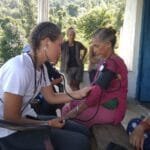
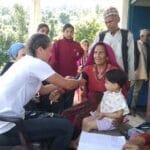
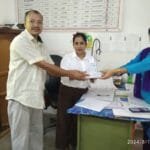
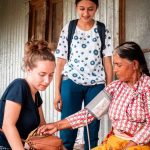
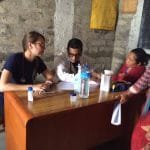
 Member of
Member of